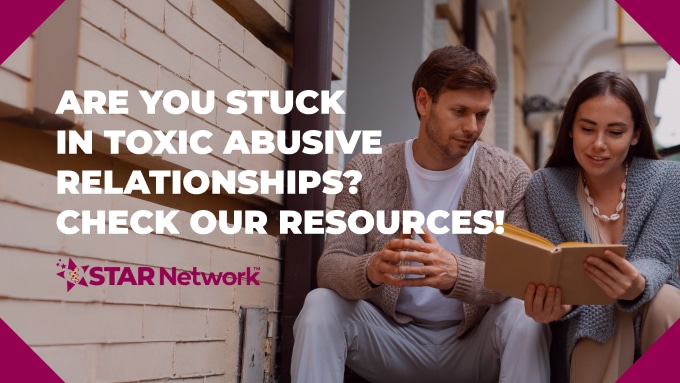Trauma-Informed Blog
New content weekly! Survivor Stories, Research Articles, Poetry, and more written by clinicians, coaches, survivors, and mental health professionals.

Featured Partner: STAR Network
Discover more about overcoming Toxic Abusive Relationships (TAR), trauma, and building resilience with our featured partner and ally, STAR Network. Their resources empower you to embrace your strength and transformation – you are not a victim; you are now a STAR, a Survivor of Toxic Abusive Relationships. Click the banner or visit STAR Network to explore their resources and start your journey to healing and empowerment today.
Remember...
CPTSD Foundation is not crisis care. If you ever feel you are in crisis please reach out to an online or local crisis resource, or contact your mental health or medical provider. CPTSD Foundation provides a tertiary means of support; adjunctive care. Our industry-leading ancillary products and services are intended to supplement individual therapy. Nothing on this website or any associated CPTSD Foundation websites, is a replacement for or supersedes the direction of your medical or mental health provider, nor is anything on this or any associated CPTSD Foundation website a diagnosis, treatment plan, advice, or care for any medical or mental health illness, condition, or disease.
Identity After Trauma
Ultimately, it is a personal identity that takes a beating in the aftermath of trauma and where the agency, dignity, and imagination of a flourishing life are short-circuited. As survivors, we...
Busyness as a Coping Strategy
Today, I am writing from the messy middle. You know the place. It is when you are in the middle of working through something difficult, and you are still trying to figure it out. That is where I...
Why Are Dysfunctional Families So Oppressive?
Unsaid expectations, insults and impossible situations set the stage for heavy oppression
She Was My Best Friend
Once you come to your senses... Sarah and I kept in close contact after they moved, and I expected her support when I finally made the decision to leave my marriage. I was wrong. I had fallen in...
The Addiction to Soft Drinks
Did you know that soda can be addictive? Soft drinks look harmless and are drunk by millions of people worldwide. Soda has been thought of as a benign substance meant to be enjoyed and served at...
Compassion and Empathy in the Age of AI
I’m a professional writer, a ghostwriter. The current buzz creating controversy in writer circles is ChatGPT, artificial intelligence. It’s an amazing tool, but it does have weaknesses....
Brainspotting and Traumatic Reenactment
My therapist and I recently ventured into the therapy modality called brainspotting. We have been using EMDR with some success to help me process the trauma from my childhood. As we began to work...
CPTSD and Online Games with Hawks and Doves
Content warning: I'm going to say some things that people might find, not nice. You have been warned, and your comments will be monitored. Today's topic is rather hard for me to define upfront...
Sinking Into Support
I just returned from traveling on business, where I facilitated an offsite for a project I am working on. My boss and co-workers accompanied me, and it turned out great. While there, I had an...
Sugar Addiction
You have probably heard of addictions to alcohol, work, and prescription drugs, but have you ever considered addiction to sugar? Sugar addiction is a real problem, especially in the developed...
Honouring the Darkness
TRIGGER WARNING: This blog discusses childhood trauma. As the cold winter darkness seems to never end, we all feel the need to slow down and to cosy up inside until spring. Unfortunately, we...
Are You Showing Up As The Leader You Want to Be?
“You are not showing up like the leader you want to be.” That is what a courageous co-worker told me after three months of swirling in a dissociative trauma response. It was true, but it was...

What is Complex Post-Traumatic Stress Disorder?
“Complex PTSD comes in response to chronic traumatization over the course of months or, more often, years. This can include emotional, physical, and/or sexual abuses, domestic violence, living in a war zone, being held captive, human trafficking, and other organized rings of abuse, and more. While there are exceptional circumstances where adults develop C-PTSD, it is most often seen in those whose trauma occurred in childhood”.







